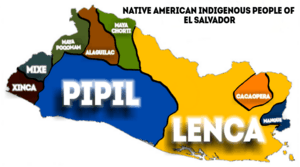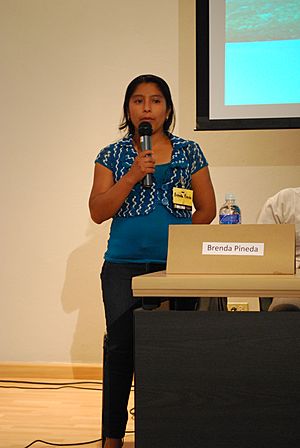Chʼortiʼ people facts for kids
| Total population | |
|---|---|
| c. 120,000 | |
| Regions with significant populations | |
| 112,432 | |
| approx. 4,200 | |
| Unknown | |
| Languages | |
| Chʼortiʼ, Spanish | |
| Religion | |
| Catholic, Evangelicalist, Maya religion | |
The Chʼortiʼ people, also called Chʼortiʼ Maya, are an indigenous group of Maya peoples. They mostly live in southeastern Guatemala, northwestern Honduras, and northern El Salvador. Their special language is called Chʼortiʼ. This language comes from an old language called Classic Choltian. Classic Choltian was used for writing on ancient stone carvings in Copán.
About 15,000 people speak Chʼortiʼ as their first language. However, most Chʼortiʼ speakers today also speak Spanish. This means they are bilingual.
Contents
History of the Chʼortiʼ People
The Chʼortiʼ area was once the main place for the ancient Mayan civilization. The city of Copán was their cultural center. The Chʼortiʼ people were led by a brave Mayan chief named Copán Galel. They fought hard against the Spanish conquerors but were not able to win.
The Chʼortiʼ are part of the Southern Mayans. They are closely related to the Mayans living in the Yucatán, Belize, and northern Guatemala. They also have some connections to the Choles, another Mayan group who live in Chiapas.
Where the Chʼortiʼ Live

In the past, the Chʼortiʼ Mayans lived in the Ocotepeque and Copan areas. Their land also stretched into northern parts of the Cortes and Santa Barbara regions. It might have even reached El Salvador to the south, Chiquimula to the west, and the Golfo Dulce to the north.
Today, most Chʼortiʼ people live in Guatemala. You can find them in places like Chiquimula, Jocotan, Esquipulas, Quezaltenango, and La Union. There are about 46,833 Chʼortiʼ people in Guatemala.
In Honduras, about 4,200 Chʼortiʼ people live in hard-to-reach areas. These include parts of the Copan and Ocotepeque departments. Some of these places are Chonco, Colon Jubuco, San Rafael, and Santa Rita. Most of them are farmers. They often live alongside mestizo people, who have mixed European and Indigenous heritage.
Chʼortiʼ Culture and Traditions
Many Chʼortiʼ people in Copan, Honduras, speak Spanish. This is because of the border between Honduras and Guatemala. It makes it harder for people to move freely between the two countries. Most Chʼortiʼ speakers are in Guatemala.
Even with these changes, the Chʼortiʼ people have kept many of their old customs. They still wear traditional clothes and enjoy their special music. They use instruments like teponangas (a type of drum), whistles, chinchins (rattles), sonajas (another type of rattle), and horns. One of their most famous traditional dances is called the "dance of the giants."
Their main foods are corn and beans. Corn is used in many ways. They make drinks like chilate, pozol, and atole (both sweet and sour). They also make tortillas, tamales, and totoposte from corn.
The Chʼortiʼ religion is about respecting and honoring nature. They perform rituals to show their thanks to the gods of the Earth and the Wind.
See also
 In Spanish: Chortís para niños
In Spanish: Chortís para niños
 | Bayard Rustin |
 | Jeannette Carter |
 | Jeremiah A. Brown |


